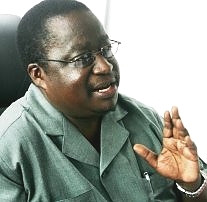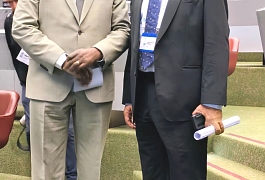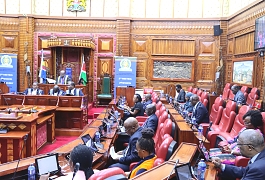Chairperson of Council of Ministers assures East Africans the Community will not collapse again
The 1st Meeting of the 4th Session of the Second East African Legislative Assembly continued this week at the Chambers of the Burundi National Assembly in Bujumbura, Burundi.
Answering several questions raised by the Honourable Members yesterday, the Chairperson of the EAC Council of Ministers and Minister of the East African Cooperation from the United Republic of Tanzania and ex-officio member of EALA, Hon. Dr. Diodorus Kamala affirmed, to the satisfaction of the members, that the integration process is onthe right course.
Responding to questions raised by Hon. Bernard Mulengani (Uganda) in regard to the Annual Calendar for operationalizing Article 134(3) of the EAC Treaty; the strategies in place to facilitate the EAC Audit Commission to conclude its work within the stipulated time; and as to why the audited accounts for Financial Year 2008/2009 had not been tabled to the regional Parliament, the Chairperson of the Council of Ministers said Article 134(3) of the Treaty should be looked at in tandem with the Regulations 79(3) of the East African Community Financial Rules and Regulations.
Article 134(3) of the Treaty stipulates that “The Audit Commission shall submit its report to the Council which shall cause the same to be laid before the Assembly within six months of receipt for debate and for such other consultations and action as the Assembly may deem necessary”.
Regulation 79(3) of the East African Community Financial Rules and Regulations stipulates that the Secretary General shall submit the draft statements of accounts to the Audit Commission ninety days from the end of the financial year, which is 30 June.
This means that the draft statements of accounts should be submitted to the Audit Commission by 30 September. The regulations require the audit to be undertaken within one month of receipt of the draft accounts. Technically the audit should commence from the month of November. The Financial Rules and Regulations are however silent as to when the Audit Commission should complete its work.
The Audit Commission is independent and as emphasized under Article 134(4) of the Treaty, it shall not be subject to the direction or control of any person or authority. In this context, it was therefore difficult for the Secretary General to program when the Audit Commission should complete its work. However the Secretary General consults regularly with the Auditors General to ensure that the audit is expedited.
In regard to the strategies put in place to facilitate the Audit Commission to conclude its work within the stipulated period, Hon. Dr. Kamala informed the House that mechanisms are in place to ensure the draft accounts are finalized by 30 September and submitted to the Audit Commission. It also includes providing the Audit Commission with all the required information and documents and facilitation of travel/logistics when the auditors are on EAC field audits.
As to why the audited accounts for the Financial Year 2008/2009 have not been tabled, the Chairperson informed the August House that the draft Financial Statements of the Community (other than the accounts of Lake Victoria Basin Commission) were submitted to the Auditors General of the Partner States on 15 November 2009.
The delay in submission was occasioned by the exercise of incorporating new depreciation rates and the revaluations/capitalization of assets as recommended by the Audit Commission and directed by the Assembly in November 2009.
The Audit Commission programmed to audit the Community’s Accounts in February 2010 and the audit commenced on 1 February 2010 and continued until 7 March 2010. The Audit Commission however could not complete the audit of the Lake Victoria Basin Commissions as the financial statements of the institution had not been completed due to limited capacity in the Accounts Department. This necessitated the auditors to go back to Lake Victoria Basin Commission on 3 May, 2010 to complete the audit.
The Audit Commission met in Arusha on 11 May, 2010 and after reviewing the draft audit reports signed the Audited Financial Statements on 13 May, 2010. Subsequently, the Audited Financial Statements were laid down on the table in the Assembly on 15 September 2010 in Bujumbura, Burundi.
Responding to questions raised by Hon. Reuben Oyondi (Kenya) on what the official reasons were for the collapse of the former Community in 1977 and what measures had been put in place to avoid such occurrences, the Chairperson informed the House that the reasons for the collapse of the former East African Community (1967-1977) were: lack of strong political goodwill; lack of strong participation of the private sector and civil society in the co-operation activities; the continued disproportionate sharing of benefits among the Member States; and lastly lack of adequate policies to address such problems.
These were highlighted in the Umbricht Report on the Mediation of Assets of the defunct East African Community and in the Mediation Agreement 1984 on the division of assets and liabilities.
Hon. Dr. Kamala assured the August House that the Partner States were confident in the current EAC and regard it as viable and sustainable project for the future of the East African people. He said the measures that have been put in place will not allow the Community to collapse again. He said these measures include and not limited to; adoption and implementation of a progressive and systematic integration process. This approach is intended to build goodwill among the Partner States.
The Chairperson reiterated that the current integration process is people-centered and private sector-driven. The Community, in its present form, is assured of strong participation of the private sector and civil society. According to the Treaty the integration process is people-centred and market driven.
For purposes of avoiding a situation of disproportionate sharing of benefits, Hon. Dr. Kamala said the Council of Ministers had agreed on the need to undertake a study on the sharing of Benefits and Gains of the Community. This measure by the Council springs from the Treaty which contains provisions on addressing imbalances. At its 18th Meeting the Council agreed on terms of reference for this study.
He said the Treaty, by demanding involvement of National Assemblies in the case of withdrawal of membership, binds the Partner States to entrench commitment to the integration process.
On the issue of different ideologies, the Chairperson noted that it was now being addressed by the Treaty which, in its Article 7 and 8, obliges the Partner States to pursue market-driven co-operation. The implementation of these provisions will avoid occurrences of undesirable ideological disparities and encourage perpetual continuity of the Community.
Minister Clarifies on Procurement of Consultancy Services
Hon. Dr. Kamala also assured Honourable Members of transparent procurement processes of consultancy services at the EAC Secretariat. Responding to Hon. Christopher Nakuleu’s (Kenya) concern on the criteria for sourcing EAC consultants, the Chairperson of the Council said the sourcing of consultancy services were undertaken competitively and in accordance with Regulation 38 of the East African Community’s Financial Rules and Regulations.
He said the procurement process was demand driven and starts with the development of the Terms of Reference which give the scope of work and timeframe of the consultancy services being sought. The Terms of Reference were developed by the user Directorate and approved by Management and in some cases are developed by Technical Experts from the Partner States and approved by the Sectoral Councils.
The 1st Meeting of the 4th Session of the second East African Legislative Assembly is due to end on 24 September 2010.
For more information please contact: Owora Richard Othieno, Ag. Head of Department; Corporate Communications and Public Affairs; Tel: +255 784 835021; Email: othieno@eachq.org
Corporate Communications and Public Affairs Department
EAC Secretariat
Arusha, Tanzania
https://www.eac.int




_265_180shar-50brig-20_c1.jpeg)